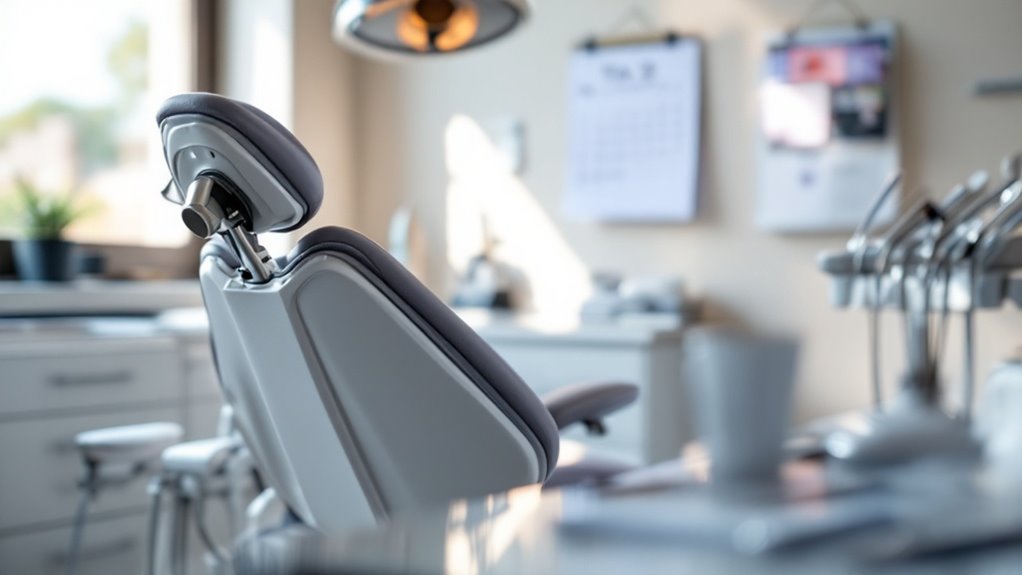Did you know that nearly 70% of dental practices miss out on significant tax savings each year due to improper equipment depreciation? It's vital to understand how to maximize your deductions to keep more cash in your practice. By implementing a few strategic approaches, you can guarantee you're not leaving money on the table. From leveraging specific tax codes to consulting with experts, there are practical steps you can take. Let us explore the essential tips that could make a noticeable difference in your financial strategy.
Key Takeaways
- Utilize Section 179 deductions to expense qualifying dental equipment purchases, reducing taxable income significantly in the year of acquisition.
- Consider the MACRS depreciation method for faster deductions, especially for new equipment, maximizing tax benefits in initial years.
- Regularly consult a dental CPA to ensure compliance and optimize the chosen depreciation method based on your practice's financial needs.
- Review and track equipment purchases annually to identify new depreciation opportunities and adjust strategies accordingly.
- Assess the long-term implications of new versus used equipment, as new purchases may offer better tax advantages and warranties.
Understand Depreciation Methods
When you're managing your dental practice, understanding depreciation methods is vital for maximizing your tax benefits.
You've got options like the straight-line method, which spreads your dental equipment's cost evenly over five years, or the declining balance method that accelerates deductions in those significant initial years, boosting cash flow.
The Modified Accelerated Cost Recovery System (MACRS) is another popular choice, offering faster depreciation schedules for tax purposes.
Don't overlook the Section 179 deduction, allowing immediate expensing of qualifying purchases up to $1,160,000 in 2023.
Plus, bonus depreciation gives you an additional primary-year deduction of 80% for those big investments, even if your practice shows a net loss.
Focus on these methods to enhance your business expenses and secure valuable tax benefits.
Leverage Section 179 Deductions
Leveraging Section 179 deductions can greatly impact your dental practice's bottom line, especially if you're planning to invest in new equipment.
This deduction allows you, as a practice owner, to expense up to $1,160,000 for qualifying purchases, markedly reducing your taxable income.
To qualify, confirm your dental equipment—like chairs and X-ray machines—is purchased and placed into service by December 31, 2023, and used over 50% for business.
Don't forget about bonus depreciation, which offers an additional initial-year bonus of 80% for qualifying purchases.
Assess New vs. Used Equipment

How do you decide between new and used dental equipment? When choosing, consider the significant tax depreciation benefits of new dental equipment, which often qualifies for immediate deductions under Section 179, maximizing your tax savings.
Used dental equipment can save you money upfront, but it usually lacks the same tax advantages. Remember, the IRS offers different recovery periods, impacting your decision.
Additionally, asset protection is crucial; new equipment often comes with better warranties and support, reducing long-term costs.
To make the finest choice for your dental practice, consult with a qualified dental CPA. They can help you assess the long-term financial implications, ensuring your qualifying purchases align with ideal tax strategies.
Consult a Dental CPA
Consulting a dental CPA can be a game-changer for your practice when it comes to maximizing tax deductions on equipment depreciation. A dental CPA understands IRS tax codes, including Section 179 and bonus depreciation, which can greatly impact your financial strategy.
They'll help you determine the best depreciation method for your unique operational needs, whether it's upfront, straight-line, or accelerated. Additionally, a dental CPA guarantees compliance with tax regulations, optimizing your depreciation reporting through Form 4562 for any qualifying purchases.
Regular consultations will keep you informed about changes in tax laws that may affect your tax return, enhancing your overall tax planning and resource allocation.
Don't underestimate the value of expert guidance in steering through equipment depreciation!
Regularly Review Tax Strategies

While tax strategies can often feel overwhelming, regularly reviewing them is essential for maximizing your deductions and ensuring compliance.
By conducting annual asset reviews, you can identify new opportunities related to depreciation and qualifying purchases, adapting your approach to changing tax laws. Keeping track of your equipment purchases and their depreciation schedules allows your dental practice to adjust these strategies effectively.
Engaging a tax advisor, especially a dental CPA, for regular consultations provides valuable insights into optimizing Section deductions and maneuvering the tax code. Understanding how depreciation impacts cash flow and taxable income helps you make better long-term financial decisions.
With consistent evaluations, you'll position your practice for success and maximize your tax benefits.
Frequently Asked Questions
How Long Do You Depreciate Dental Equipment?
You typically depreciate dental equipment over five years. Using various depreciation methods affects asset valuation, impacting cash flow and tax implications. Proper accounting practices guarantee tax compliance while managing capital expenses and maintenance costs effectively.
What Is the Tax Strategy for Depreciation?
To maximize tax benefits, you should explore various depreciation methods aligned with IRS guidelines. This involves strategic financial planning, optimizing asset valuation, and leveraging tax incentives to enhance cash flow from capital investments throughout the equipment lifespan.
Is Equipment a 100% Write-Off?
Envision your equipment as the golden goose of your practice. If it's classified correctly under IRS guidelines, you can enjoy tax benefits through immediate deductions, enhancing cash flow while managing capital expenses and optimizing financial planning.
How to Depreciate Equipment for Taxes?
To depreciate dental equipment, consider methods like Section 179 for immediate expensing, bonus depreciation for accelerated cost recovery, and follow IRS guidelines to classify assets based on their useful life for accurate financial reporting and tax implications.
Conclusion
By following these tips, you can turn tax depreciation into an influential tool for your dental practice. Understanding depreciation methods, leveraging Section 179 deductions, and evaluating your equipment options are just the start. Consulting a dental CPA and regularly reviewing your strategies will keep you ahead of the game. Remember, maximizing your tax benefits might feel like finding a golden tooth in a sea of molars—rare and rewarding! So, take action now and watch your savings grow.


